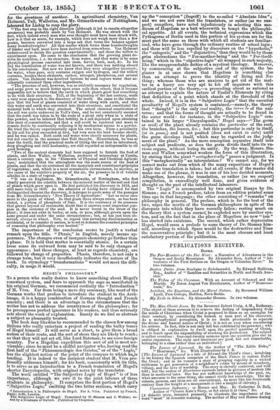HEGBL'S PHILOSOPHY. *
To a person who really desires to know something about Hegel's renowned system, and fears to approach the sage as manifested in his original German, we recommend cordially the " Introduction " of H. Vera. Far from being a mere dry summary, like most of the German works that profess to introduce the student to the Arch- image, it is a happy combination of German thought and French amenity ; and there is an advantage in the circumstance that the writer has not to address the countrymen of the philosopher ; for he presupposes perfect ignorance in his readers, and thus seriously sets about the work of explanation. Rarely do we find so abstruse a subject so pleasantly treated.
The book may likewise be recommended to the chosen few among Britons who really entertain a project of reading the bulky tomes of Hegel himself. It will serve as a chart, to give them a broad notion of their route, and the sort of shore they are likely to reach; so that they will not set off, like Lord Bateman, to see some foreign country. For a Hegelian expedition this sort of aid is most ser- viceable ; since lie must be a skilful navigator who, having read the first half of the " Phinomenologie des Geistes," or of the "Logic," has the slightest notion of the point of the compass to which he„is
i
tending. It is indeed to the incipient student that M. Vera pro- fessedly addresses himself ; for his book, consistently with its title, is to serve as an Introduction to a French translation of Hegel's shorter Encyclopedia, with original notes by the translator.
The work entitled "The Subjective Logic of Hegel" is of less importance, although we owe it to the joint labours of three students in philosophy. It comprises the first portion of Hegel's "Subjective Logic," omitting the two latter sections, which carry
• Introduction a is Philosophie de Hegel. Par A. Vera. Published by Franck, Paris; Jeffs, London.
The Subjective Logic of Hegel. Translated by H. Sloman and J. Wallon; re- lied by a Graduate of Oxford. Published by Chapman. up the "conception" (Begriff) to the so-called "Absolute Idea"; and we are not sure that the translators, or rather (as we sus- pect) compilers, have acted injudiciously in selecting this mo- dicum of Hegelism as a bait wherewith to tempt the philosophi- cal appetite. At all events, the technical expressions which the Pythagoras of Berlin used in this portion of his system are for the most part the same as those with which all students are familiar- ized, who have gone through the ordinary routine of school logic ; and these will be less repelled by discourses on the "hypothetic," the " categoric," and the " disjunctive," than they would be by those grim abstractions the " For-another-being " and the "For-itself- being," which in the " objective logic" sit wrapped in such majesty, _ like the unapproachable deities of a mystical theology. Moreover, by commencing at the subjective end of the system, the be- ginner is at once shown that Hegelism is something else than an attempt to prove the identity of Being and No- thing; whereas those who are anxious to get rid of the mat- ter in a hurry are very apt to fob off inquirers with this earliest portion of the theory,—a proceeding about as rational as an attempt to explain the nature of Euclid's Elements by citing that definition of a point which stands at the threshold of the whole. Indeed, it is in the " Subjective Logic " that the essential peculiarity of Hegel's system is oontained,—namely, the theory that "thought" is the only real reality, the arreev av of the uni- verse ; and that the forms of thought are actually to be found in the outer world : for instance, in the "Subjective Logic" con- tained in his larger " Encyclopedia," Hegel says—" The germ or seed) of the plant already contains the particular of the root, the branches, the leaves, &c. ; but this particular is only in itself, (or in posse,) and is not posited (does not exist in actu) until the germ develops itself, which may be regarded as thejudg- ment of the plant." As the mere conception separates itself into subject and predicate, so does the germ divide itself into its vs, rious organs, without losing its unity. By the way, Messrs. Slo. man and Wallon somewhat weaken the force of this illustration, by stating that the plant "metaphorically "passes a judgment. Is this " metaphorically " an interpolation? We cannot say, for we cannot make out from which of the many expositions of Hegel's Login the translation is taken ; but at all events, if the master did make use of the phrase, it was in one of his less decided moments. Altogether, however, the translation, or rather (as we suspect) compilation, is exceedingly, well done, and gives evidence of thought on the part of the intellectual labourers. The " Logic"- is accompanied by two original Essays by Dr. Sloman ; one a French preface, taken from an edition printed some time ago in that language; the other consisting of "remarks" on philosophy in general. The preface, which is far the best of the two, urges the merits of the German philosophers in spite of the disrepute into which they have recently fallen; resting much on the theory that a system cannot: be exploded save by another sys- tem, and on the fact that in the place of Hegelism no new " ism" has started into existence. The second, which rather depreciates Hegel, would seem a prelude to some theory of Dr. Sloman him- self, according to which Space would be the destructive and Time the conservative principle ; but it is the most obscure and least satisfactory portion of the publication.


























 Previous page
Previous page